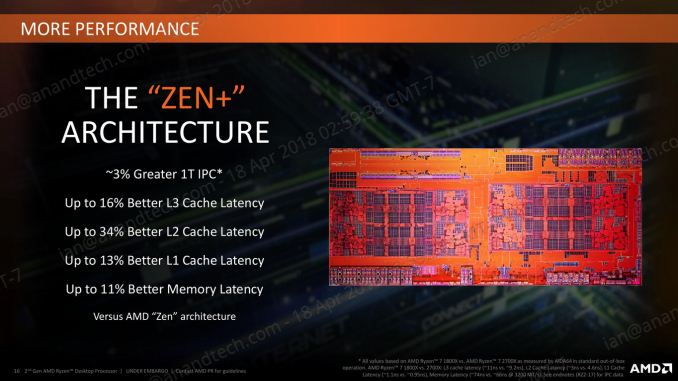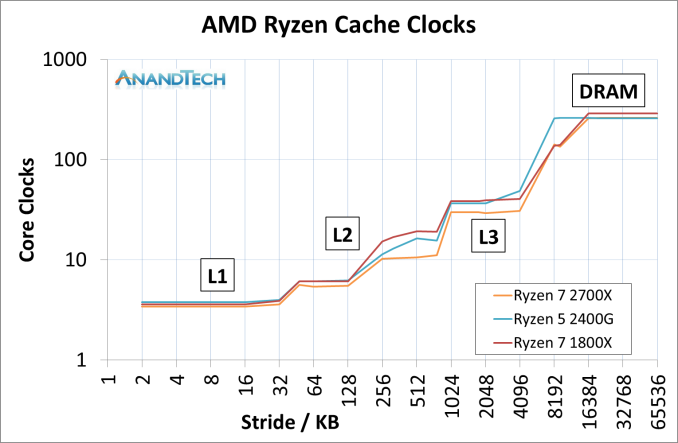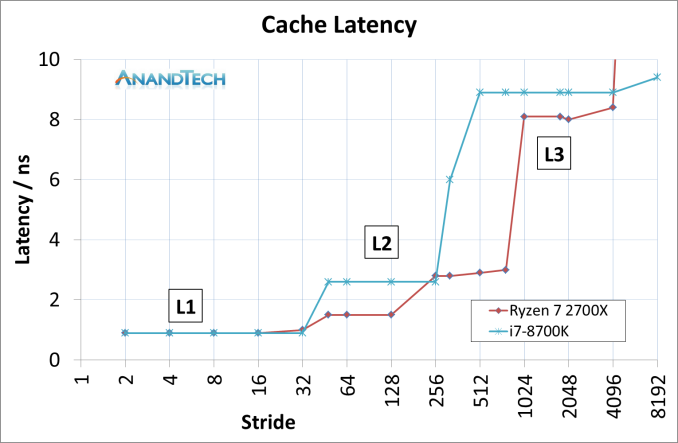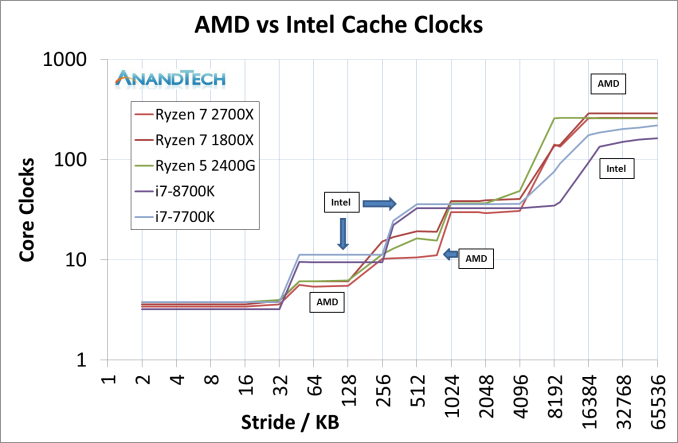The AMD 2nd Gen Ryzen Deep Dive: The 2700X, 2700, 2600X, and 2600 Tested
by Ian Cutress on April 19, 2018 9:00 AM ESTImprovements to the Cache Hierarchy
The biggest under-the-hood change for the Ryzen 2000-series processors is in the cache latency. AMD is claiming that they were able to knock one-cycle from L1 and L2 caches, several cycles from L3, and better DRAM performance. Because pure core IPC is intimately intertwined with the caches (the size, the latency, the bandwidth), these new numbers are leading AMD to claim that these new processors can offer a +3% IPC gain over the previous generation.
The numbers AMD gives are:
- 13% Better L1 Latency (1.10ns vs 0.95ns)
- 34% Better L2 Latency (4.6ns vs 3.0ns)
- 16% Better L3 Latency (11.0ns vs 9.2ns)
- 11% Better Memory Latency (74ns vs 66ns at DDR4-3200)
- Increased DRAM Frequency Support (DDR4-2666 vs DDR4-2933)
It is interesting that in the official slide deck AMD quotes latency measured as time, although in private conversations in our briefing it was discussed in terms of clock cycles. Ultimately latency measured as time can take advantage of other internal enhancements; however a pure engineer prefers to discuss clock cycles.
Naturally we went ahead to test the two aspects of this equation: are the cache metrics actually lower, and do we get an IPC uplift?
Cache Me Ousside, How Bow Dah?
For our testing, we use a memory latency checker over the stride range of the cache hierarchy of a single core. For this test we used the following:
- Ryzen 7 2700X (Zen+)
- Ryzen 5 2400G (Zen APU)
- Ryzen 7 1800X (Zen)
- Intel Core i7-8700K (Coffee Lake)
- Intel Core i7-7700K (Kaby Lake)
The most obvious comparison is between the AMD processors. Here we have the Ryzen 7 1800X from the initial launch, the Ryzen 5 2400G APU that pairs Zen cores with Vega graphics, and the new Ryzen 7 2700X processor.
This graph is logarithmic in both axes.
This graph shows that in every phase of the cache design, the newest Ryzen 7 2700X requires fewer core clocks. The biggest difference is on the L2 cache latency, but L3 has a sizeable gain as well. The reason that the L2 gain is so large, especially between the 1800X and 2700X, is an interesting story.
When AMD first launched the Ryzen 7 1800X, the L2 latency was tested and listed at 17 clocks. This was a little high – it turns out that the engineers had intended for the L2 latency to be 12 clocks initially, but run out of time to tune the firmware and layout before sending the design off to be manufactured, leaving 17 cycles as the best compromise based on what the design was capable of and did not cause issues. With Threadripper and the Ryzen APUs, AMD tweaked the design enough to hit an L2 latency of 12 cycles, which was not specifically promoted at the time despite the benefits it provides. Now with the Ryzen 2000-series, AMD has reduced it down further to 11 cycles. We were told that this was due to both the new manufacturing process but also additional tweaks made to ensure signal coherency. In our testing, we actually saw an average L2 latency of 10.4 cycles, down from 16.9 cycles in on the Ryzen 7 1800X.
The L3 difference is a little unexpected: AMD stated a 16% better latency: 11.0 ns to 9.2 ns. We saw a change from 10.7 ns to 8.1 ns, which was a drop from 39 cycles to 30 cycles.
Of course, we could not go without comparing AMD to Intel. This is where it got very interesting. Now the cache configurations between the Ryzen 7 2700X and Core i7-8700K are different:
| CPU Cache uArch Comparison | ||
| AMD Zen (Ryzen 1000) Zen+ (Ryzen 2000) |
Intel Kaby Lake (Core 7000) Coffee Lake (Core 8000) |
|
| L1-I Size | 64 KB/core | 32 KB/core |
| L1-I Assoc | 4-way | 8-way |
| L1-D Size | 32 KB/core | 32 KB/core |
| L1-D Assoc | 8-way | 8-way |
| L2 Size | 512 KB/core | 256 KB/core |
| L2 Assoc | 8-way | 4-way |
| L3 Size | 8 MB/CCX (2 MB/core) |
2 MB/core |
| L3 Assoc | 16-way | 16-way |
| L3 Type | Victim | Write-back |
AMD has a larger L2 cache, however the AMD L3 cache is a non-inclusive victim cache, which means it cannot be pre-fetched into unlike the Intel L3 cache.
This was an unexpected result, but we can see clearly that AMD has a latency timing advantage across the L2 and L3 caches. There is a sizable difference in DRAM, however the core performance metrics are here in the lower caches.
We can expand this out to include the three AMD chips, as well as Intel’s Coffee Lake and Kaby Lake cores.
This is a graph using cycles rather than timing latency: Intel has a small L1 advantage, however the larger L2 caches in AMD’s Zen designs mean that Intel has to hit the higher latency L3 earlier. Intel makes quick work of DRAM cycle latency however.














545 Comments
View All Comments
John_M - Monday, April 23, 2018 - link
What edition of Windows 10 to typical gamers use and why?johnsmith222 - Monday, April 23, 2018 - link
In the meantime we have a lot benches to analyse :)Sum of web benches:
https://www.3dcenter.org/news/ryzen-2000-launchrev...
oRAirwolf - Monday, April 23, 2018 - link
I would really like to see some storage bench mark to compare pre and post Spectre/Meltdown patching of Intel CPUs as well as an apples-to-apples comparison of nvme storage performance compared to an Intel 8700k.Silma - Monday, April 23, 2018 - link
It's really hard to generalize on why people purchase the processors they do.I met a guy online with an over the top, super expensive computer. His sole purpose seems to be the first in the online tests and he will spend hours fine tuning the overclocking and whatnot.
Another guy mostly playing D3 purchased a 3K euro computer, which is absolutely over the top for what he plays/does. His reasoning is, I change my computer every 10 years, so when i do, I want the best components.
In my opinion, for most people without special needs (YouTube encoding, 3D rendering and whatnot), most processors have been good enough for years, and there is no reason to invest a lot in a processor when money is much better spent in an x4 PCIe SSD where you'll instantly feel the difference vs a hard drive or a medium quality SSD.
To me, power consumption and noise of processor as well as graphic card is a consideration at least as important as price.
The sole reason I would change processor today would be to get a fully Thunderbolt 3 compatible system, since the first TB3 audio interfaces are slowly coming to market.
Then again, I'm sure many people will have other priorities and reasons for purchasing their processors.
Targon - Monday, April 23, 2018 - link
Many of these high end systems are overpriced, or they come with components that are not worth it for what is being done. With that being said, going for a higher end CPU does make sense for those looking to keep their systems for a long time. Video cards and storage are areas that people should pay close attention to when it comes to price.NVMe drives are VERY expensive if you go up to the 1TB level, so spending that sort of money doesn't make sense when the prices will drop in the next two years. A 250-500GB NVMe drive would make more sense when combined with a traditional hard drive for additional storage. Video cards are also at a premium right now, as is RAM. If the system were purchased back in April of 2017, then yea, not too horrible to go for 32GB of RAM back then, but now, I'd stick with 16GB of RAM due to the prices being so much higher than they were.
For desktops, Thunderbolt isn't all that amazing when you can add a video or sound card to the system that will do what you want it to. Laptops are another story, and you need to pick and choose your priorities.
Flying Aardvark - Monday, April 23, 2018 - link
That's if you're short on money. I don't spend much extra other than vacations & eating very well. So when I upgrade, which is every 5 to 10 years, I buy the best available like Silma. I have a 1TB 960 Pro for that reason, it was $650 and I didn't think twice about it. I need the most reliable, fastest drive at the time. The 960 Pro is a MLC memory configuration, I've always used higher end MLC drives and they've served me very well.I'm not waiting a year or two, when I have over $100,000 sitting in my bank account doing nothing. What's the point, it's just $650. Same goes for the rest of my computer, which I only own/maintain one of.
Not everyone is a child or someone who doesn't spend the majority of their time progressing their careers so they can make more money. The price consideration is not the end-all, ultimate rule on hardware for every single consumer.
mapesdhs - Monday, April 23, 2018 - link
Indeed, though I guarantee some here will react poorly at the notion of someone who can make such a purchasing decision. :) Sometimes the best makes perfect sense, and if one can afford it, then why not.Kaihekoa - Monday, April 23, 2018 - link
Why are Anand's gaming numbers showing the 2700X beating all Intel CPUs when every other reviewer still shows the 8700K/7700K still being the best gaming CPUs?Flying Aardvark - Monday, April 23, 2018 - link
TechRadar & the wccftech preview has the same results. If you have been following Spectre as I have, you would've seen even users find this result. See the top comments here. https://np.reddit.com/r/pcmasterrace/comments/7obo...AT, TR & WCCF's results are accurate. Many reasons for this.
- Many reviewers used the old Ryzen balanced power setting which cripples the 2700X
- Disallowed the motherboard settings that push the chip over TDP
- Fully patched as possible for Spectre v1 & v2, which cripples Intel up to 50% in IO heavy tasks (streaming textures for games that do so).
There is naturally, lots of resistance to the fact that AMD is dominating. It's over for now, time for people to just admit it, they got screwed if they don't have Ryzen. Or at least, bought the inferior product.
mapesdhs - Monday, April 23, 2018 - link
I don't think those posting so much venom about the results will change their minds until AMD releases something that really is just right out the gate blatantly faster, including for IPC. Another year or two and I think that will happen.